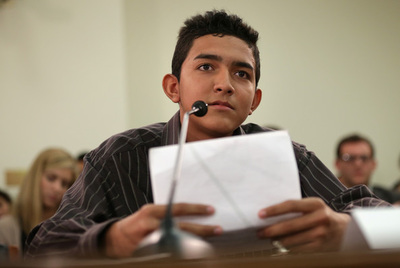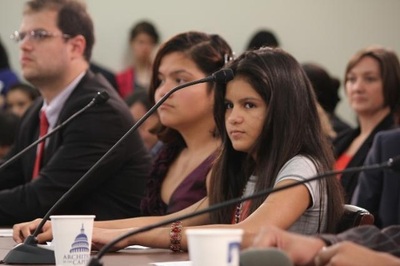Three Central American Children testified before the Congressional Progressive Caucus in Washington D.C. on Tuesday July 29th, 2014. The children were: Mayeli Hernandez, 12, migrated from Honduras last year in July of 2013; Dulce Medina, 15, came from Guatemala at five years of age; and Saúl Martínez, 15, from El Salvador, the most recent refugee from the group whom arrived in just April of this year. All of the children made their journey as unaccompanied minors. They shared their experiences of violence in Central America, their arduous journey through Mexico and into the United States, as well as the abuse and dehumanization they faced in U.S. immigration facilities upon arrival. Speaking directly to their time spent in the “ice-boxes” or unbearably cold holding cells without blankets or warm clothing, the children recounted how in some cases people would turn blue due to the slowing of blood circulation. Saúl Martinez had this to say, “Please don’t mistreat children the way your government has mistreated me. Finally, I want to ask you not to deport children like me because it’s very possible that you will deport them to violence and to their death.”
Watch the full video here.
"Why Nicaraguan Kids Aren’t Fleeing to the U.S.”
San Diego radio station KPBS discusses Nicaragua’s absence from the unaccompanied Central American children debate. Nicaragua is one of the poorest countries in Central America, has a difficult history of war and violence yet doesn’t have masses of children heading to the U.S.-Mexico border. This article attempts to find the reasons for the Nicaraguan exception from this humanitarian crisis. The piece suggests the lower rates of criminal activity, community policing, the successes of the Sandinista revolution, and the individual decisions of many Nicaraguans to forego the American Dream for work, advancement, and stability in neighboring Costa Rica.
Read the full article here.
El Salvador Part of a United Latin American Front Against Israel
El Salvador is one of five countries in Latin America, and the only one in Central America, to recall its ambassadors from Tel Aviv. El Salvador follows the example of Brazil, Chile, Ecuador and Peru who have done the same. It is worth mentioning that Cuba was the first Latin American country to sever ties with Israel in 1973. Venezuela and Bolivia both cut diplomatic ties with Israel in 2009. Argentina, Mexico, Nicaragua, and Uruguay have also condemned the Israeli assault but have not formally cut ties with the State of Israel. El Salvador, which has a sizeable Palestinian community living on its soil, continues to protest against Israel’s illegal military offensive in Gaza. The Salvadoran Ministry of External Relations recently stated, "This action is taken before the serious escalation of violence and implementation of indiscriminate bombing from Israel into the Gaza Strip that has killed children, girls, women and men.”
Read the article in Spanish here.
Co-written and co-curated by Daniel Alvarenga and Jorge Cuéllar


 RSS Feed
RSS Feed
